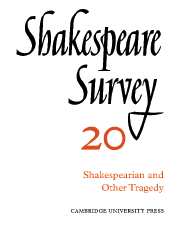Book contents
- Frontmatter
- Shakespeare, Fletcher and Baroque Tragedy
- Seneca and the Elizabethans: A Case-study in ‘Influence’
- George Chapman: Tragedy and the Providential View of History
- Critical Disagreement about Oedipus and Hamlet
- Shakespeare’s Thematic Modes of Speech: ‘Richard II’ to ‘Henry V’
- Anarchy and Order in ‘Richard III’ and ‘King John’
- The Staging of Parody and Parallels in ‘I Henry IV’
- Shakespeare’s Unnecessary Characters
- Walter Whiter’s Notes on Shakespeare
- Shakespeare’s ‘Romeo and Juliet’: Its Spanish Source
- The Grieves Shakespearian Scene Designs
- Shakespeare on the Modern Stage: Past Significance and Present Meaning
- Shakespeare in Brazil
- Recent Shakespeare Performances in Romania
- Shakespeare, the Twentieth Century and ‘Behaviourism’
- The Year's Contributions to Shakespearian Study 1 Critical Studies
- 2 Shakespeare’s Life, Times and Stage
- 3 Textual Studies
- Index
- Plate section
Critical Disagreement about Oedipus and Hamlet
Published online by Cambridge University Press: 28 March 2007
- Frontmatter
- Shakespeare, Fletcher and Baroque Tragedy
- Seneca and the Elizabethans: A Case-study in ‘Influence’
- George Chapman: Tragedy and the Providential View of History
- Critical Disagreement about Oedipus and Hamlet
- Shakespeare’s Thematic Modes of Speech: ‘Richard II’ to ‘Henry V’
- Anarchy and Order in ‘Richard III’ and ‘King John’
- The Staging of Parody and Parallels in ‘I Henry IV’
- Shakespeare’s Unnecessary Characters
- Walter Whiter’s Notes on Shakespeare
- Shakespeare’s ‘Romeo and Juliet’: Its Spanish Source
- The Grieves Shakespearian Scene Designs
- Shakespeare on the Modern Stage: Past Significance and Present Meaning
- Shakespeare in Brazil
- Recent Shakespeare Performances in Romania
- Shakespeare, the Twentieth Century and ‘Behaviourism’
- The Year's Contributions to Shakespearian Study 1 Critical Studies
- 2 Shakespeare’s Life, Times and Stage
- 3 Textual Studies
- Index
- Plate section
Summary
‘The art of representation’, says Henry James in the Preface to Roderick Hudson, ‘bristles with questions the very terms of which are difficult to apply and appreciate.’ Questions of dramatic representation almost in variably involve the critic in attempts to apply and appreciate terms first used by Aristotle in the Poetics. Critical controversy about Aristotle’s exact meaning has tended to distract attention from the fact that, although his terms may not always be satisfactory, the questions that he asked are still important. In re-opening two old controversies I should like to try to demonstrate that there is a tradition of disagreement about certain passages in the Oedipus Tyrannus and in Hamlet. These disagreements are not simply an occupational hazard of criticism or further evidence of what Aldous Huxley has eloquently described as ‘the prevalence of folly, its monumental unchanging permanence, and its almost unvariable triumph over the forces of intelligence’. So far from belonging to the Dunciad Variorum these disagreements are relevant to our own concerns and are part of the evidence for believing, with Sir John Myres, that:
Criticism, in spite of popular misapprehension, is a progressive and constructive study, tending not only to the discipline of a liberal education, but in the strictest sense to the advancement of science.
- Type
- Chapter
- Information
- Shakespeare Survey , pp. 33 - 40Publisher: Cambridge University PressPrint publication year: 1967

